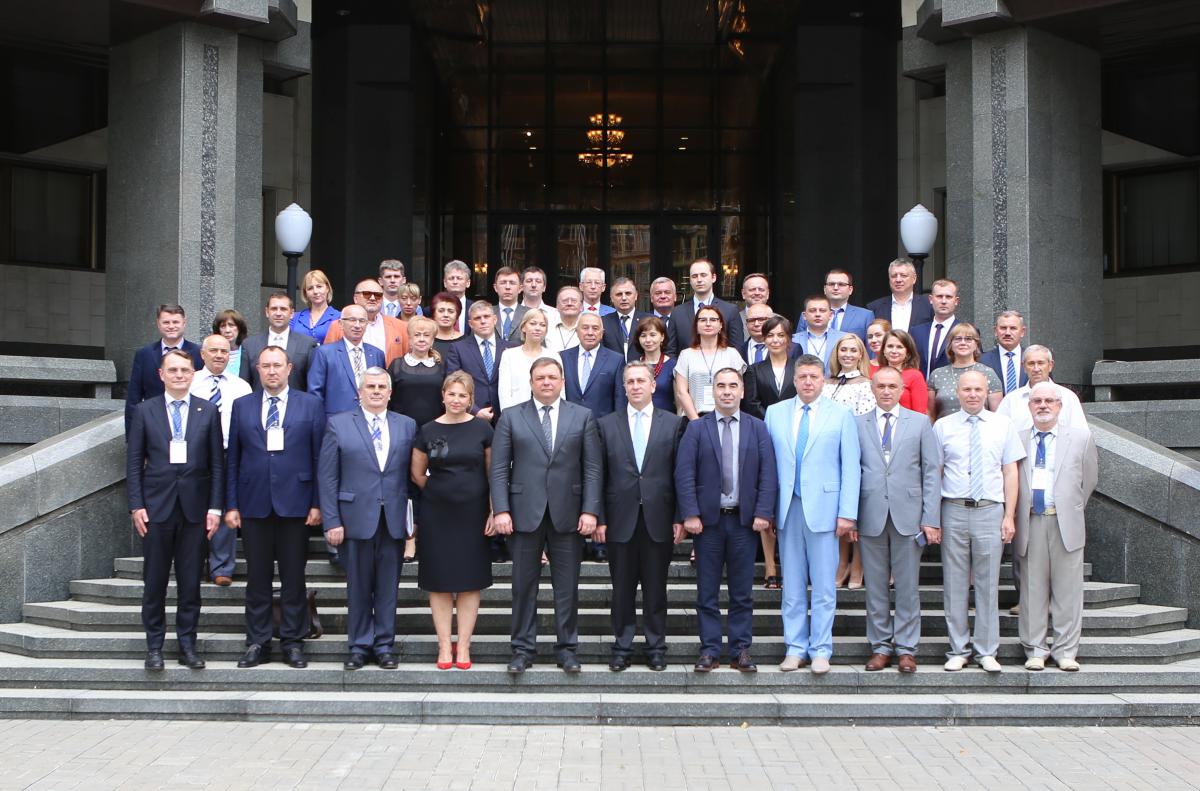“Protection of human rights and freedoms is the most important task of the state”, the participants of the international research seminar, held at the Constitutional Court of Ukraine are convinced (updated)
27.06.2018
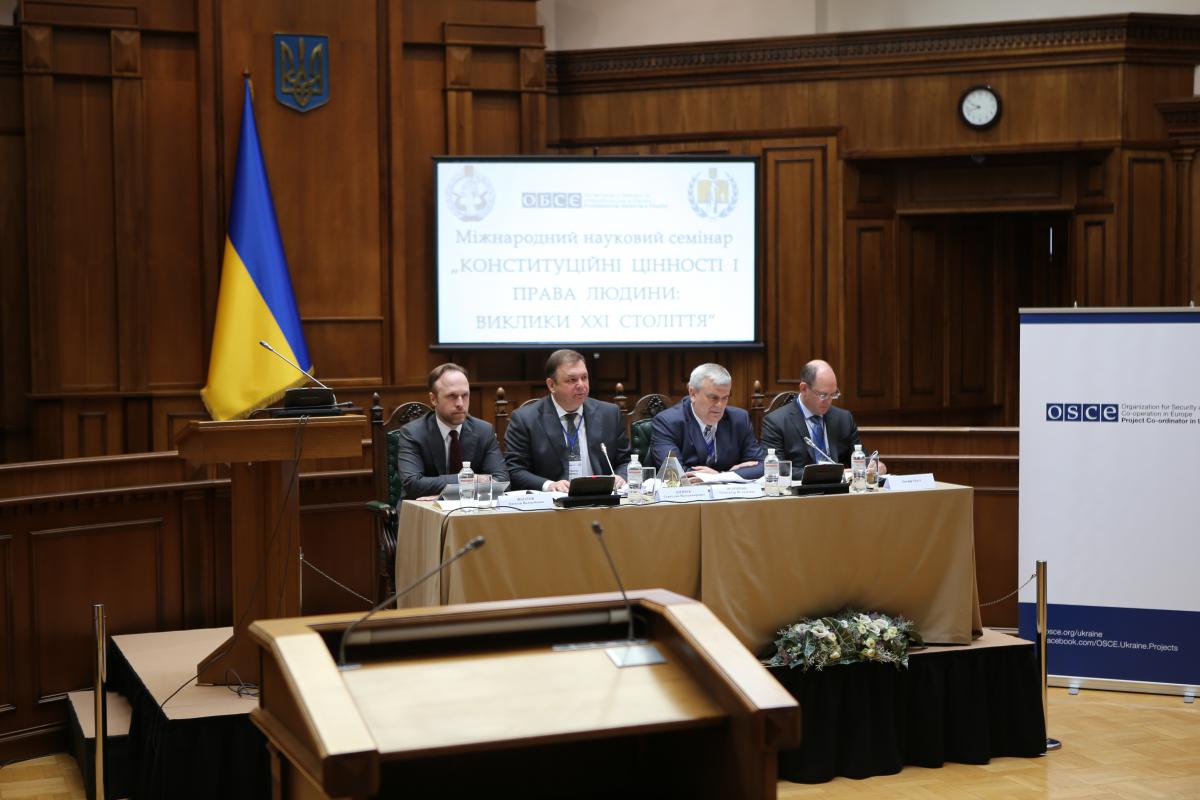 The international research seminar “Constitutional values and human rights: challenges of the XXI century” on the occasion of the 22nd anniversary of the adoption of the Constitution of Ukraine, organised by the Constitutional Court of Ukraine, in cooperation with the National Academy of Legal Sciences of Ukraine and with support of the OSCE Project Co-ordinator in Ukraine, brought together a number of well-known theorists and practitioners of the constitutional law of Ukraine and foreign countries in order to discuss the challenges of the 21st century in the field of the protection of the highest value in a democratic state – an individual, his/her rights and freedoms.
The international research seminar “Constitutional values and human rights: challenges of the XXI century” on the occasion of the 22nd anniversary of the adoption of the Constitution of Ukraine, organised by the Constitutional Court of Ukraine, in cooperation with the National Academy of Legal Sciences of Ukraine and with support of the OSCE Project Co-ordinator in Ukraine, brought together a number of well-known theorists and practitioners of the constitutional law of Ukraine and foreign countries in order to discuss the challenges of the 21st century in the field of the protection of the highest value in a democratic state – an individual, his/her rights and freedoms.
“Twenty-two years ago, the Constitution of our country entered into public life as the main gatekeeper of statehood, democracy and independence. It defines the fundamental principles on which the present is based and the future of the Ukrainian people is built. In its turn, the main calling of the Constitutional Court of Ukraine is to ensure the rule of the Basic Law in the state and public life of our country”, commenced his speech Stanislav Shevchuk, Chairman of the Constitutional Court of Ukraine.
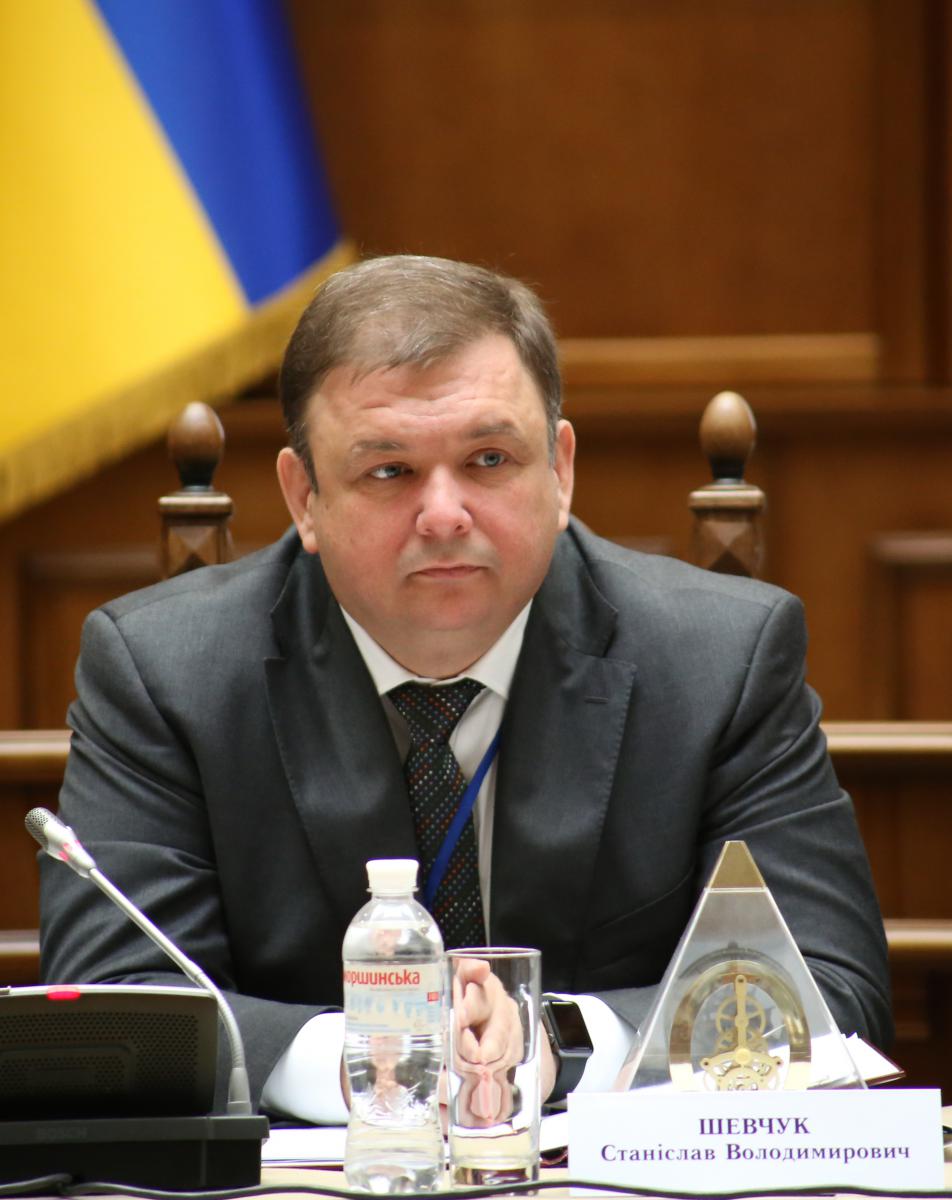 He stressed that today's event is aimed at comparing benchmarks in order to determine which direction the Constitutional Court of Ukraine should follow, fulfilling its main task of protecting human and civil rights and freedoms.
He stressed that today's event is aimed at comparing benchmarks in order to determine which direction the Constitutional Court of Ukraine should follow, fulfilling its main task of protecting human and civil rights and freedoms.
This should be done for several reasons, said Stanislav Shevchuk, in particular, in view of the events that took place in Ukraine in 2013-2014, which became a powerful catalyst for the reform processes in the Ukrainian society and resulted in tangible changes in the matter of effective protection of human rights.
The Chairman of the Court mentioned that today the country is undergoing reform changes in the most important areas of life, including the legal one. Therefore, in his opinion, there is a heavy need to clarify once again, on what grounds and on what ideological basis these changes take place and what their purpose is. He emphasised that there is an urgent need to understand the ideological, theoretical and practical foundations for the protection of human and citizen’s rights, and that is why the support on the part of the scholars is essentially needed.
The realities of the 21st century carry particular risks in the context of the implementation of constitutional values and especially for the countries in which the period of systemic instability has not yet come to an end, unfortunately, Ukraine is included in this list, noted the Chairman of the Court. At the same time, the speaker is convinced that constitutional values should become a working instrument for the protection of human rights.
According to Stanislav Shevchuk, the work on the protection of human rights in each country reproduces the peculiarities of the national legal system in a broader perspective. At the same time, the Chairman of the Court is convinced that the international standards and development trends in the field of human rights protection, including the experience of the European Court of Human Rights, the Court of Justice of the European Union, the development trends of the law formed by the Venice Commission, Council of Europe institutions, etc.
The Chairman of the Constitutional Court of Ukraine noted that the jurisprudence of the constitutional courts of foreign states is extremely valuable, the methods and approaches with which the judges of constitutional courts of other countries study and resolve these problems. At the end of the speech, Mr. Shevchuk wished the participants fruitful work and an interesting discussion.
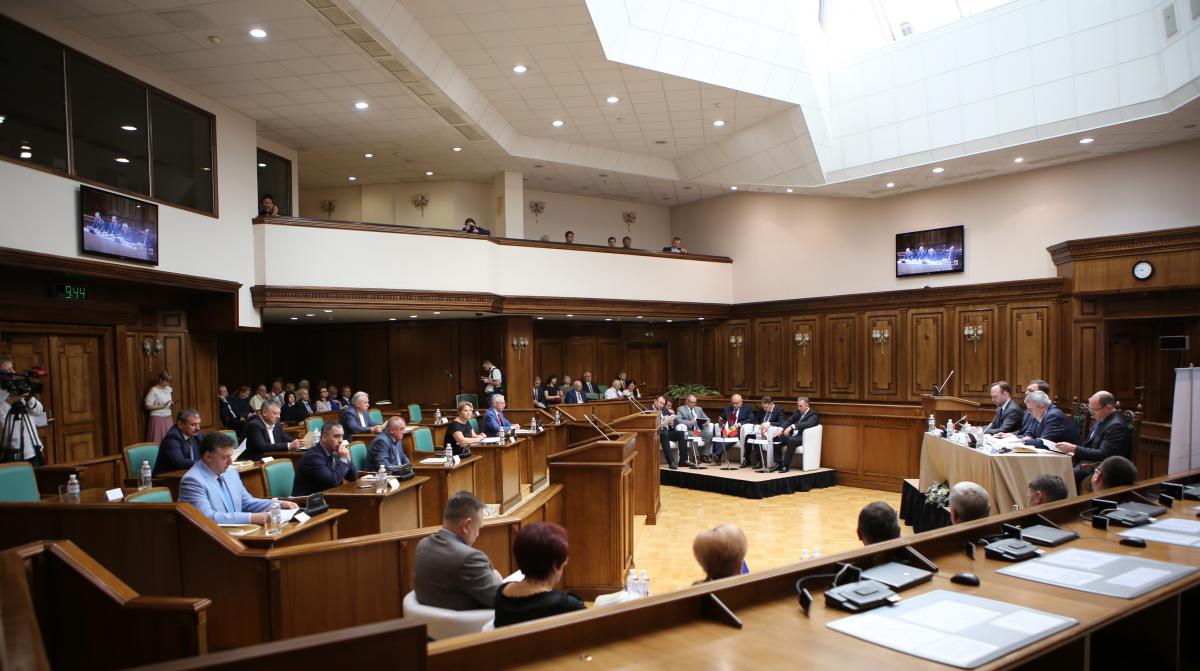 President of the National Academy of Legal Sciences of Ukraine, Full Member of the National Academy of Legal Sciences of Ukraine Oleksandr Petryshyn, the Deputy Head of the Presidential Administration of Ukraine Oleksii Filatov, and OSCE Senior Project Officer Jeffrey Erlich addressed the audience with greetings.
President of the National Academy of Legal Sciences of Ukraine, Full Member of the National Academy of Legal Sciences of Ukraine Oleksandr Petryshyn, the Deputy Head of the Presidential Administration of Ukraine Oleksii Filatov, and OSCE Senior Project Officer Jeffrey Erlich addressed the audience with greetings.
Oleksandr Petryshyn noted that respect for the Basic Law, constitutional values and human rights are key factor in stabilising the national legal system and understanding the values enshrined in the Constitution of Ukraine.
According to the speaker, the precondition for his is overcoming two stereotypes: first, the perception of the norms of the Constitution of Ukraine as declarative, and secondly, the understanding of the Basic Law as a detailed instruction that should cover certain aspects of the functioning of state power. According to him, there is a discussion about these two approaches in academic environment.
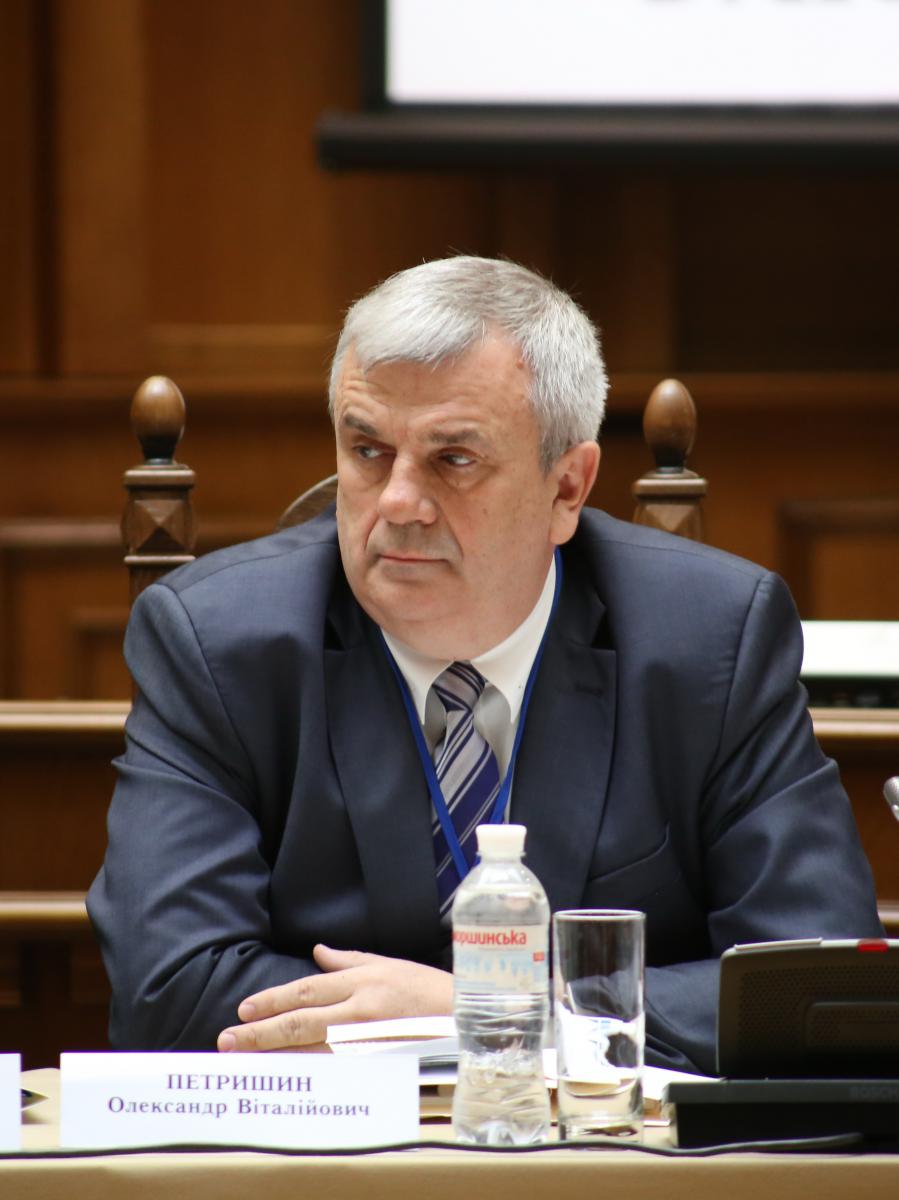 At the same time, Oleksandr Petryshyn noted that the activity of the Constitutional Court of Ukraine, namely its decisions, play an important role in relation to society in the Constitution of Ukraine. “The more effectively the Constitutional Court of Ukraine will work, the greater will be respect for the Fundamental Law not only among scholars but the society as a whole”, he emphasised.
At the same time, Oleksandr Petryshyn noted that the activity of the Constitutional Court of Ukraine, namely its decisions, play an important role in relation to society in the Constitution of Ukraine. “The more effectively the Constitutional Court of Ukraine will work, the greater will be respect for the Fundamental Law not only among scholars but the society as a whole”, he emphasised.
The speaker also mentioned that the National Academy of Legal Sciences of Ukraine is currently preparing for the publication of the Great Ukrainian Law Encyclopedia of twenty volumes, which contains an updated view of the major issues related to jurisprudence.
Finally, he wished the fruitful work and accomplishment of the expected results from the work of the seminar.
On behalf of the President of Ukraine, Oleksii Filatov congratulated the participants of the seminar on the coming Constitution Day of Ukraine and noted that the human being, his/her rights and freedoms occupy the most important place as compared to other legal phenomena.
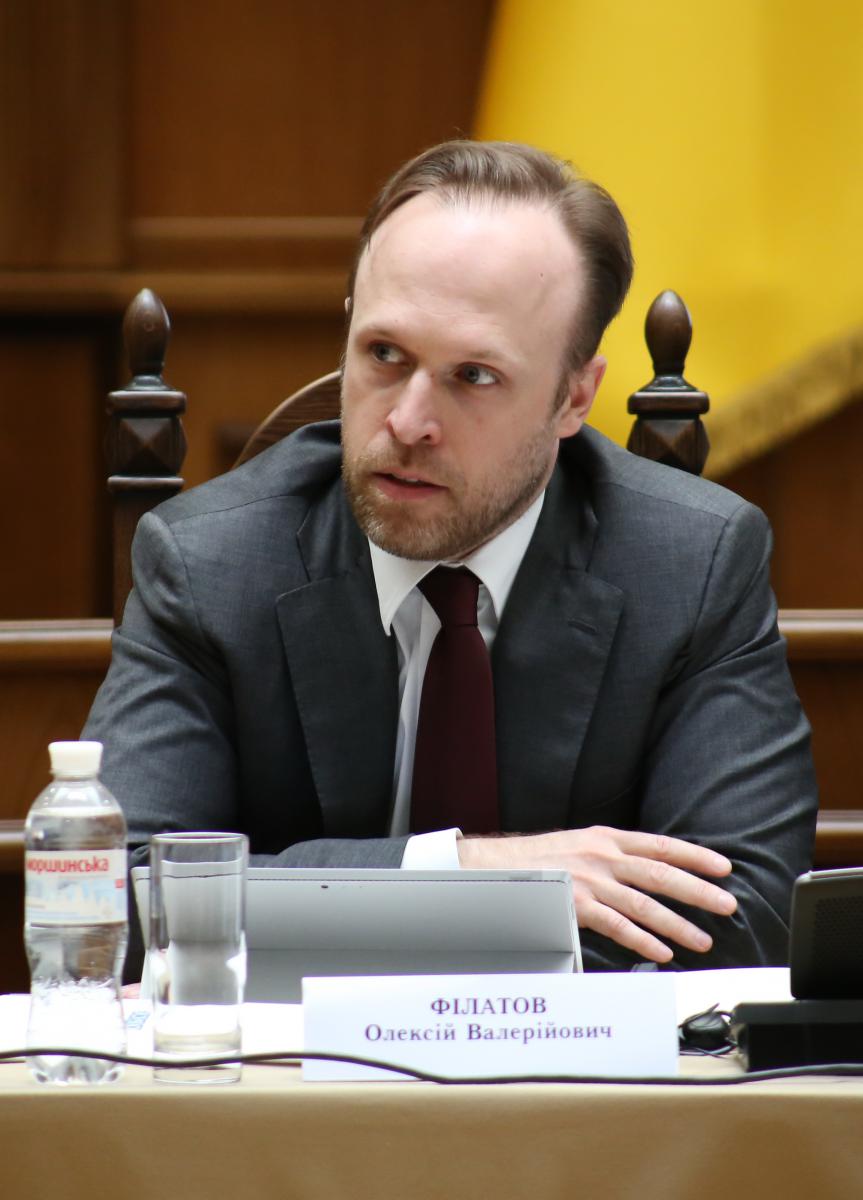 He recalled the main steps that had been taken to improve the exercise of human and civil rights and freedoms, in particular, within the framework of judicial reform in Ukraine. “Over the last four years, a lot has been done so that the constitutional provisions really worked”, Oleksii Filatov noted. Also, the speaker stressed that judicial reform among other things, was aimed at restoring the independence of the judiciary, in particular, the Constitutional Court of Ukraine.
He recalled the main steps that had been taken to improve the exercise of human and civil rights and freedoms, in particular, within the framework of judicial reform in Ukraine. “Over the last four years, a lot has been done so that the constitutional provisions really worked”, Oleksii Filatov noted. Also, the speaker stressed that judicial reform among other things, was aimed at restoring the independence of the judiciary, in particular, the Constitutional Court of Ukraine.
The Law of Ukraine “On Constitutional Court of Ukraine”, by which the Constitutional Court of Ukraine is guided in its activity, contains provisions on guarantees of independence of judges, competitive principles for the selection of the Constitutional Court judges, as well as a number of other positive changes. At the same time, it is necessary to continue work on improving legislation and mechanisms for the protection of human rights. “One of these mechanisms, i.e. the constitutional complaint - has already begun to function”, noted Deputy Head of the Presidential Administration of Ukraine. He emphasised that the institute of constitutional complaint is a step forward in improving the system of human rights protection. Thanks to this institution, Ukraine has become much closer to the European standards. From now on, every citizens may apply to the Constitutional Court of Ukraine and receive protection of his/her rights and freedoms guaranteed by the Constitution. “This is a big step towards the practical application of the Basic Law”, mentioned Oleksii Filatov.
In his opinion, the Constitutional Court has not only played the role of the “stabiliser” of relations between the branches of state power, but also has direct powers in the field of human rights protection.
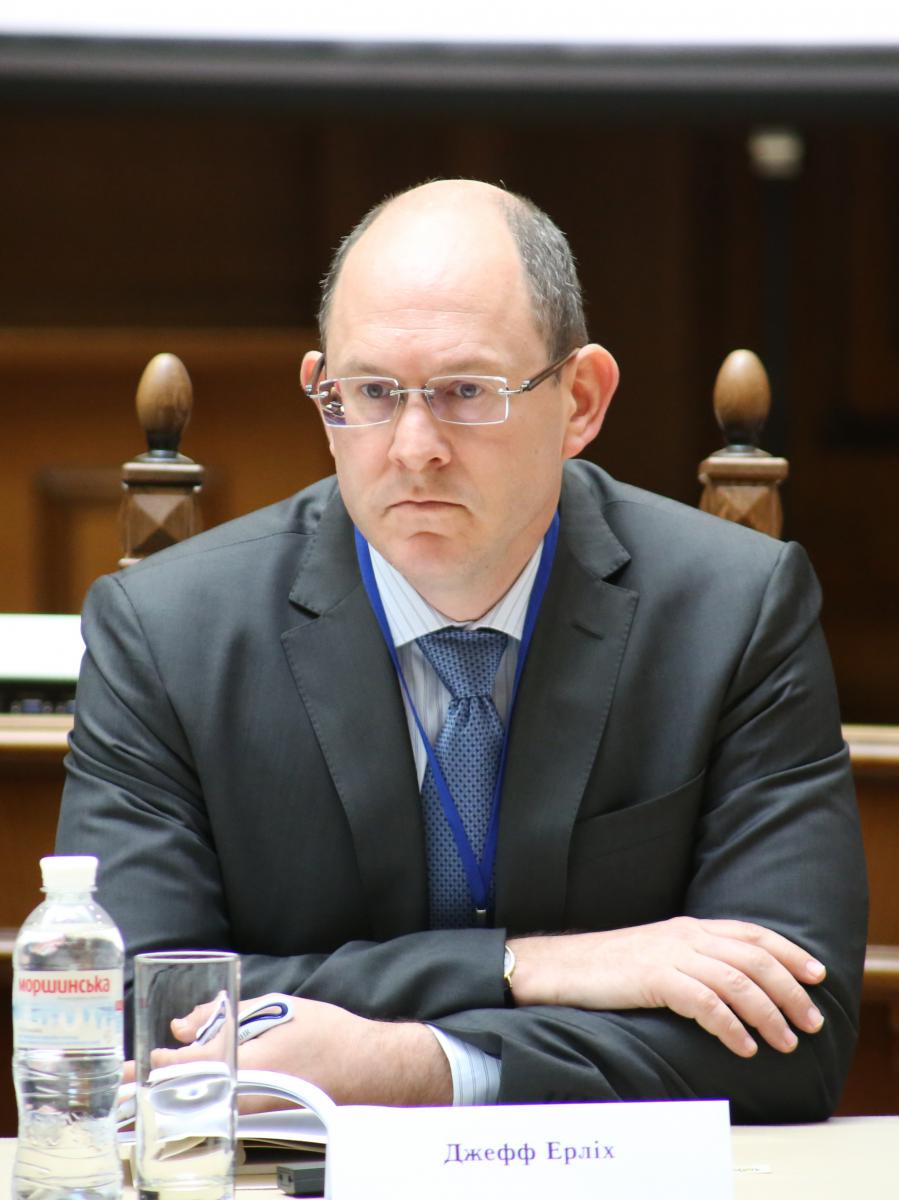 Jeffrey Erlich noted that the OSCE Project Co-ordinator in Ukraine fully supports the Constitutional Court of Ukraine, in particular, through the implementation of joint projects in the field of human right protection. According to him, the accession of Constitutional Tribunal of the Republic of Poland to the Association of Constitutional Justice of the Countries of the Baltic and Black Sea Regions will contribute to the development of constitutional justice of the member states of the organisation.
Jeffrey Erlich noted that the OSCE Project Co-ordinator in Ukraine fully supports the Constitutional Court of Ukraine, in particular, through the implementation of joint projects in the field of human right protection. According to him, the accession of Constitutional Tribunal of the Republic of Poland to the Association of Constitutional Justice of the Countries of the Baltic and Black Sea Regions will contribute to the development of constitutional justice of the member states of the organisation.
OSCE Senior Project Officer noted that in Ukraine discussions are continuing as to what the Basic Law should be. He emphasised that the Constitution is the foundation of the rule of law, the basis for all other normative legal acts which must comply with its provisions. Also, the US Constitution begins with the words “We the People of the United States…”, which emphasised the importance of the human being, noted Jeffrey Erlich.
The President of the Constitutional Court of Georgia, President of the Association of Constitutional Justice of the Countries of the Baltic and Black Sea Regions Zaza Tavadze reported at the international research seminar on the role of the Constitutional Court of Georgia in defending democratic values and fundamental rights.
On behalf of the Constitutional Court of Georgia and the Association of Constitutional Justice of the Countries of the Baltic and Black Sea Regions Zaza Tavadze sincerely congratulated the Ukrainian people on a remarkable holiday – Constitution Day of Ukraine. The speaker noted that our countries have a lot in common both in political and legal aspects. He emphasised the importance of the Association for both states-parties and other institutions of constitutional jurisdiction in protecting human rights and fundamental freedoms, guaranteeing democratic principles and values.
In addition, the speaker described the experience of the work of the Constitutional Court of Georgia and noted that Georgia belongs to a young state, where human rights are a continuously developing category and a special role in protecting of rights and freedoms is played by the constitutional jurisdiction body. Based on the Court’s decision on the freedom of religious belief, the speaker mentioned about the constitutional values of citizens of the Constitutional Court of Georgia and the promotion of the application of the norms in practice.
Svitlana Bobrovnyk, Doctor of Law, Head of the Theory of State and Law Department of Taras Shevchenko National University of Kyiv reported about the value aspects of the Constitution.
“Today, the value aspects of the Constitution are one of the fundamental categories which define the essence of law, its significance for society and build the behaviour of each of us daily and at all times”. The speaker emphasised that the right which is perceived as a value is not violated, it is respected and implemented.
She described, in particular, the historical value of the Constitution, reflecting the historical stages of the development of society and the state, and is the result of the evolution of any society; about the political one which is regulated at the constitutional level; about philosophical, as well as spiritual, cultural, moral, social values that reflect the meaning of the Constitution for the whole society.
The report “Values and principles of the constitutional system of Ukraine: general theoretical characteristics” was delivered by the Doctor of Law, Professor, Corresponding Member of the National Academy of Legal Sciences of Ukraine, Vice-Rector for Academic Affairs of Yaroslav Mudryi National Law University Iurii Barabash. Speaking about the relationship of principles and values, the speaker noted that the principles and values of the Constitution are complementary categories that should be used in constitutional proceedings, especially when applying the proportionality test. In his opinion, the values themselves should be the measure that will allow for the final decision. “Principles, unlike values, are universal in nature, while values in many constitutional systems are conditioned by historical and political development”, the scholar stated.
Doctor of Law, Professor, Director of the Research Institute for Comparative Public Law and International Law of Uzhgorod National University Mykhailo Savchyn presented the report on “Interpretation and balancing of the constitutional values and human rights”. The speaker stressed that the Constitution is a certain system of principles and values, which are the result of joint activities of people and mutual consent. “The court weighs good and evil, and must judge properly, and the bearers of certain values must express these values and protect them”, mentioned the speaker.
In his speech, he presented the system of constitutional values, in particular the American one, which tends to the values of freedom, as well as the Continental-European system, which, after the World War II, began to bow to the idea of protecting human dignity.
The scholar noted that human dignity is on the verge of constitutional values and is specified in accordance with human rules.
Professor of Uzhgorod National University Mykhailo Savchyn presented his monograph on “Contemporary Trends in Constitutionalism in the Context of Globalisation and Legal Pluralism”, devoted to contemporary trends of the globalisation of constitutional law, in which the borrowing and exchange of best practices in the protection of human rights at institutional and procedural levels play a key role.
The President of the Constitutional Court of the Republic of Lithuania Dainius Žalimas, congratulated participants on the 22nd anniversary of the Constitution of Ukraine and wished Ukraine victory in the struggle against Russian aggression, on the path to European and Euro-Atlantic integration, on the internal reform front, as well as courage and success to the Constitutional Court of Ukraine in strengthening and protecting democratic European values, the rule of law and the Constitution.
Dainius Žalimas presented the report on “Protection of human rights and constitutional identity: experience of the Republic of Lithuania”. The speaker dwelt in detail upon certain notions of “constitutional identity”, which, in his opinion, are important”. He emphasised that human rights are part of the constitutional identity of all our states. The purpose of the Constitution of the Republic of Lithuania is to protect the values proclaimed in the Act of Independence of Lithuania and formulated by the Constitutional Court of the Republic of Lithuania in the doctrine of constitutionality, constitutional changes, said Dainius Žalimas.
The President of the Constitutional Court of the Republic of Lithuania asserts that the constitutional identity of the Republic of Lithuania, the first part of which, according to him, consists of the concepts such as democracy and the nature of human rights. “Constitutional identity is also used in the context of concrete values”, he said. And in his opinion, both are related to democracy. Dainius Žalimas emphasised that human rights should be understood in the way that they are understood in well-developed countries, the countries of established western democracies.
Head of the Theory of State and Law Department of the Koretsky Institute of State and Law of the National Academy of Sciences of Ukraine, Full Member of the National Academy of Legal Sciences of Ukraine Nataliia Оnіshchеnkо devoted her report to the “Human rights: modern context”, which focused on the concept of “right” and the peculiarities of the perception of this concept by modern society.
“Of course, the Ukrainian struggle for human rights had been marked by various tragic, and heroic, and patriotic, and populist steps. But for today, unfortunately, we no longer notice positive changes and approaches to them. There is a minimisation of real human rights”, she stressed.
In her speech, she touched upon the issue of procedural, legal equality and relative equality in the distribution of material goods.
According to Nataliia Оnіshchеnkо, the Constitution guarantees equal rights to citiznes, which is their guarantee against the oppression of the state, officials, discrimination by state institutions. “There are no secondary rights”, she mentioned.
Judge of the Constitutional Court of the Republic of Moldova Veaceslav Zaporojan, on behalf of the Constitutional Court of the Republic of Moldova, congratulated participants on the Constitution Day and spoke about the role of constitutional courts in defending against disinformation.
One of the means of ensuring democracy is the right to receive information, which is sometimes perceived as a human right to social life and at the same time is combined with freedom of speech, the speaker stressed.
After the world’s society fought for freedom of expression of ideas, the boomerang effect subsequently led to dissemination of informational propaganda by misinformation, Veaceslav Zaporojan stressed. Loyalty to justice should be a fundamental principle in the process of informing the population. The problem of informing arises not only at the national level, but often in the interests of political forces at the national level in the form of international propaganda. The question is how to restrict freedom of expression in order to secure the right to receive information. “Propaganda is used to perceive the world by specific people”, he emphasised.
Furtherver, the speaker dwelt in detail upon the experience of the Constitutional Court of the Republic of Moldova in combating informational propaganda.
Anatolii Kolodii, Doctor of Law, Professor, Corresponding Member of the National Academy of Legal Sciences of Ukraine, Director of the Educational and Scientific Institute “Institute of Law of the National Economic University named after Vadym Hetman, delivered the report on “Values and legal principles of the European integration process of Ukraine”.
He highlighted the issues of common law values and the European integration process. The speaker noted that the value as such is studied by axiology, and also identified three types of values of the right - for the person, collective and society.
The speaker stressed that our country is currently in the process of integrating into the European legal space, and, in his opinion, this must be done reasonably and consistently. “Harmonisation and adaptation must prevail in this process”, Anatolii Kolodii stated.
Justyn Piskorski, Justice of the Constitutional Tribunal of the Republic of Poland, addressed the participants of the research seminar, and raised the issues of human rights, freedom and identity in the constitutional courts. “This event is a symbol of the development of our countries”, highlighted the speaker. According to him, the era of independence of the represented states should create a new history, and the fruitful cooperation of the constitutional courts of the region will become a symbol of this process.
The speaker stressed that the key notion for understanding the concept of human rights is freedom. “Freedom forms the entire system of human rights protection”, he added. Justyn Piskorski mentioned that ensuring the effectiveness of the rule of law, the protection of human rights and the functioning of the legal system in general lies with the bodies of constitutional jurisdiction.
A report on the “The Constitutional Court of Ukraine in the constitutional and legal mechanism for the protection of human rights and freedoms” was delivered by Doctor of Law, Professor, Head of Constitutional Law Department of Taras Shevchenko National University of Kyiv Oleh Martseliak. First of all, the speaker wished the participants the implementation of the provisions of the Constitution of Ukraine in practice, peace and tranquility in the state.
The scholar noted that the Constitutional Court of Ukraine occupies a leading place in the protection of human rights and freedoms. During the functioning of the Court, added the speaker, more than 300 decisions were ruled, 90% of which were aimed at protecting human rights.
In his speech, Oleh Martseliak paid special attention to the institute of constitutional complaint. He noted that this is a new, promising mechanism for the protection of human rights, but in his opinion, it needs to be improved, in particular, through a more detailed analysis of international practice. He stressed that today a very responsible mission is assigned to the constitutional control body of the country, since the first decisions on constitutional complaints, in his view, should strengthen the people’s faith in the Constitutional Court of Ukraine.
Alexandru Tănase, member of the Venice Commission, Chairman of the Constitutional Court of the Republic of Moldova (2011-2017) has raised the issue of democracy and the legitimacy of state power. He stressed that Ukraine and Moldova have a common past. “We first experienced the Soviet occupation, and then the Russian aggression against our states”, added the spokesman.
Alexandru Tănase noted that the departure from democracy towards authoritarianism, as history shows, is a matter of several steps, not decades. “In this context, it must be remembered that it is exclusively constitutionalism which can restrict state power”, he stressed.
The member of the Venice Commission emphasised that the maintenance of democracy in the state depends on Constitutional Court. However, in his opinion, the body of constitutional control must also adapt, evolve in order to meet the requirements of time.
Another interesting report “The law-protection function of the Constitutional Court of Ukraine” was presented by Doctor of Law, Professor, Director of the Research Center for Forensic Examination on Intellectual Property Vladyslav Fedorenko. He highlighted the fact that most states have their legitimate genealogy since the proclamation of independence. In Ukraine, an important role was also played by the moment of adoption of the Basic Law. According to the scholar, the Constitutional Court of Ukraine, together with the Constitution, experienced various historical stages. “After the constitutional reform, the Constitutional Court of Ukraine became a true arbiter between the branches of power”, the speaker stressed.
Permanent Representative of the President of Ukraine in the Autonomous Republic of Crimea, Borys Babin presented a report entitled “The protection of constitutional human rights in the temporarily occupied territory”. In particular, he stressed that, despite the armed aggression of the Russian Federation, Ukraine has no right to neglect the rights of its citizens. “The most important, inalienable rights and freedoms must be ensured despite any circumstances”, he noted.
According to the speaker, the aggressor country successfully manipulates the category of human rights, noting the so-called protection of a specific part of the population of our state.
Borys Babin expressed the hope that the constitutional jurisdiction in Ukraine will be able to provide effective protection of human rights and freedoms.
Vasyl Kostytskyi, professor of the Taras Shevchenko National University of Kyiv, co-author of the Constitution of Ukraine described the prerequisites and the process of adopting the Basic Law, and also noted that the Constitution of Ukraine acts to ensure the rights and freedoms of all people.
Former judge of the Constitutional Court of Ukraine Viktor Shyshkin spoke about the observance of human rights in the context of the representative functions of the constitutional control body in Ukraine and other important issues of constitutional justice.
In conclusion, the Chairman of the Constitutional Court of Ukraine Stanislav Shevchuk informed that the reports and speeches of the participants of the international research seminar “Constitutional values and human rights: challenges of the XXI century” will be included in the special issue of the “Public Law” journal.
Stanislav Shevchuk also thanked everyone for productive work, important ideas and accomplishments, and also invited the audience to the reception in the Constitutional Court’s yard.

